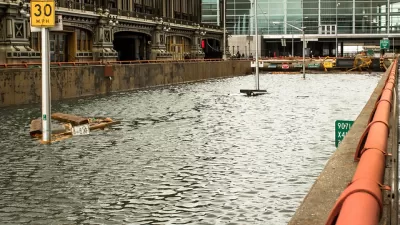Dysfunctional and wasteful practices have defined the army Corps of Engineers for years. Despite being caught in the act many times, the Corps continues to propose and push forward unnecessary projects, according to this article.
"In 2000, the Army Corps of Engineers was caught red-handed concocting its justification before launching a $1 billion project on the upper Mississippi River system. After the scandal died down, the corps admitted there wasn't really enough barge traffic to justify construction -- but proposed a $4 billion project, because there was a remote possibility things might change someday. And yes, the project recently sailed through a united Congress, where water projects are a time-honored form of political currency that steer jobs and money to the constituents and contributors of powerful members."
"By corps standards, pouring thousands of tons of concrete into the Mississippi and Illinois Rivers to relieve nonexistent barge congestion with seven new locks is no environmental disaster; those rivers are already highly engineered and degraded. But it is a stark example of the dysfunction of the corps -- its dishonest analyses, anachronistic priorities, predilection for makework, and desperation to please its congressional patrons and special-interest clients. And that dysfunction is itself an environmental disaster -- not only because some of the porky boondoggles it produces destroy pristine rivers and enormous swaths of wetlands, but because an honest corps with better priorities could help revive America's ravaged ecosystems."
"Since 2000, corps leaders have repeatedly promised more environmental sensitivity and better economic analyses. But they keep rubber-stamping the same wasteful and destructive pork that soured their reputations in the first place. As I have written in Grist, the dysfunction of the corps and America's water resources system drowned the city of New Orleans and killed more than 1,000 people in 2005. And not even that catastrophe has prompted change. So I was pretty naïve to expect the debacle on the upper Mississippi to lead to reform."
FULL STORY: Cry Me a River

Alabama: Trump Terminates Settlements for Black Communities Harmed By Raw Sewage
Trump deemed the landmark civil rights agreement “illegal DEI and environmental justice policy.”

Planetizen Federal Action Tracker
A weekly monitor of how Trump’s orders and actions are impacting planners and planning in America.

The 120 Year Old Tiny Home Villages That Sheltered San Francisco’s Earthquake Refugees
More than a century ago, San Francisco mobilized to house thousands of residents displaced by the 1906 earthquake. Could their strategy offer a model for the present?

Ken Jennings Launches Transit Web Series
The Jeopardy champ wants you to ride public transit.

BLM To Rescind Public Lands Rule
The change will downgrade conservation, once again putting federal land at risk for mining and other extractive uses.

Indy Neighborhood Group Builds Temporary Multi-Use Path
Community members, aided in part by funding from the city, repurposed a vehicle lane to create a protected bike and pedestrian path for the summer season.
Urban Design for Planners 1: Software Tools
This six-course series explores essential urban design concepts using open source software and equips planners with the tools they need to participate fully in the urban design process.
Planning for Universal Design
Learn the tools for implementing Universal Design in planning regulations.
Clanton & Associates, Inc.
Jessamine County Fiscal Court
Institute for Housing and Urban Development Studies (IHS)
City of Grandview
Harvard GSD Executive Education
Toledo-Lucas County Plan Commissions
Salt Lake City
NYU Wagner Graduate School of Public Service





























